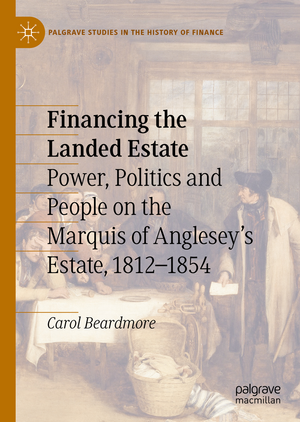Financing the Landed Estate: Power, Politics and People on the Marquis of Anglesey’s Estate, 1812–1854: Palgrave Studies in the History of Finance
Autor Carol Beardmoreen Limba Engleză Hardback – 22 mai 2019
Din seria Palgrave Studies in the History of Finance
-
 Preț: 362.11 lei
Preț: 362.11 lei - 9%
 Preț: 764.94 lei
Preț: 764.94 lei - 9%
 Preț: 626.30 lei
Preț: 626.30 lei - 18%
 Preț: 737.26 lei
Preț: 737.26 lei - 15%
 Preț: 522.89 lei
Preț: 522.89 lei -
 Preț: 451.65 lei
Preț: 451.65 lei - 15%
 Preț: 701.06 lei
Preț: 701.06 lei - 18%
 Preț: 726.37 lei
Preț: 726.37 lei - 15%
 Preț: 712.22 lei
Preț: 712.22 lei - 15%
 Preț: 530.25 lei
Preț: 530.25 lei - 18%
 Preț: 1114.21 lei
Preț: 1114.21 lei - 18%
 Preț: 1006.55 lei
Preț: 1006.55 lei - 18%
 Preț: 726.06 lei
Preț: 726.06 lei - 18%
 Preț: 786.84 lei
Preț: 786.84 lei - 18%
 Preț: 792.03 lei
Preț: 792.03 lei - 18%
 Preț: 724.94 lei
Preț: 724.94 lei - 15%
 Preț: 702.54 lei
Preț: 702.54 lei - 18%
 Preț: 723.69 lei
Preț: 723.69 lei -
 Preț: 388.72 lei
Preț: 388.72 lei - 15%
 Preț: 694.19 lei
Preț: 694.19 lei - 18%
 Preț: 782.72 lei
Preț: 782.72 lei - 15%
 Preț: 637.59 lei
Preț: 637.59 lei - 18%
 Preț: 1108.51 lei
Preț: 1108.51 lei - 9%
 Preț: 920.31 lei
Preț: 920.31 lei - 15%
 Preț: 711.89 lei
Preț: 711.89 lei -
 Preț: 383.12 lei
Preț: 383.12 lei - 18%
 Preț: 891.33 lei
Preț: 891.33 lei - 18%
 Preț: 958.25 lei
Preț: 958.25 lei - 18%
 Preț: 1008.28 lei
Preț: 1008.28 lei -
 Preț: 445.88 lei
Preț: 445.88 lei - 18%
 Preț: 1113.58 lei
Preț: 1113.58 lei - 15%
 Preț: 646.75 lei
Preț: 646.75 lei - 15%
 Preț: 702.05 lei
Preț: 702.05 lei -
 Preț: 450.11 lei
Preț: 450.11 lei - 18%
 Preț: 794.39 lei
Preț: 794.39 lei - 18%
 Preț: 948.29 lei
Preț: 948.29 lei - 18%
 Preț: 728.74 lei
Preț: 728.74 lei
Preț: 697.97 lei
Preț vechi: 821.14 lei
-15% Nou
Puncte Express: 1047
Preț estimativ în valută:
133.55€ • 139.45$ • 110.29£
133.55€ • 139.45$ • 110.29£
Carte tipărită la comandă
Livrare economică 15-29 aprilie
Preluare comenzi: 021 569.72.76
Specificații
ISBN-13: 9783030145514
ISBN-10: 3030145514
Pagini: 222
Ilustrații: XI, 236 p. 1 illus.
Dimensiuni: 148 x 210 mm
Greutate: 0.45 kg
Ediția:1st ed. 2019
Editura: Springer International Publishing
Colecția Palgrave Macmillan
Seria Palgrave Studies in the History of Finance
Locul publicării:Cham, Switzerland
ISBN-10: 3030145514
Pagini: 222
Ilustrații: XI, 236 p. 1 illus.
Dimensiuni: 148 x 210 mm
Greutate: 0.45 kg
Ediția:1st ed. 2019
Editura: Springer International Publishing
Colecția Palgrave Macmillan
Seria Palgrave Studies in the History of Finance
Locul publicării:Cham, Switzerland
Cuprins
1. Introduction.- 2. Estate Finances and Administration.- 3. Working Relationships.- 4. Social Relationships.- 5. Politics and the Landed Estate.- 6. Social Control: Church, Charity and Education- 7. Conclusion.
Recenzii
“The resulting volume is not only a delight to read but provides real insight into the way that a heterogeneous late-Hanoverian/Victorian country estate could be effectively managed against a highly fluid social, financial and political landscape. … this volume will appeal across the board, from enthusiastic amateurs to serious scholars of rural history, social relations and the landed aristocracy. … it breaks genuinely new ground.” (Peter Jones, Family & Community History, Vol. 22 (3), October, 2019)
Notă biografică
Carol Beardmore holds Research Fellowships at the University of Leicester, UK and part-time lectureships at De Montfort University, UK, and the Open University, UK. Dr. Beardmore has had articles published in Rural History and Family and Community History and chapters in The Land Agent in Britain: Past, Present and Future (2016), Living the Family: A Study of Family Life, c.1650-1900 (2019) and Disability Matters (2018).
Textul de pe ultima copertă
While there is an extensive historiography which explores English agriculture in the nineteenth century, there has been less attention paid to individual estates and in particular the role of the land agent within their management, administration and participation in rural community relationships. Nowhere is this more obvious in the lack of research into the financial history of the landed estate, even though in the early nineteenth century these were some of the largest businesses in England. The Castleman letters are a rich source which detail the intricate working, financial, social and political relationships which constituted the foundation of the landed estate. The vouchers of which more than 10,000 have survived alongside the rental accounts have rarely been examined. On their own they illustrate, for example: the sums paid out on maintenance, the interest payments on mortgages, charitable expenditure, spending on property repairs and one-off payments for a wide and diverse range of items. Together with the diurnal correspondence all three aspects of the archive detail the daily financial undertakings and form the foundation of a new financial history of the estate. This book will show that estate management was underpinned by an inherent understanding of the financial decisions which needed to be taken, and will be of interest to academics and researchers of financial history.
Caracteristici
Unravels the financial story of the Marquis of Anglesey’s estates in Dorset and Somerset Creates an understanding of the complexities of estate finances and administration and explores the role of the estate manager Examines the ways in which the estate sought to impose social control through the spending of monies on items such as education, paying voting incentives and the negotiating of rental agreements Explores how the estate formed part of an economy of expedience through the setting up of local industries, charitable payments to the poor, food, clothing and coal allowances
